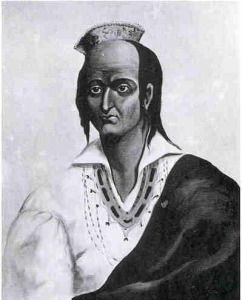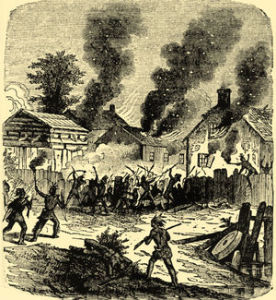The New England colonies of Plymouth and Massachusetts Bay suffered through a terrible war with the natives in 1675-1676. It is called King Philip’s War and, percentage-wise, a higher portion of the population died in that war than in any other American war since; not even the Civil War or WWII suffered as high a casualty rate.
What caused it? Who is to blame?
We must take a balanced look at it. When we do, we see that there is some blame on both sides, but at the root of it was greed, envy, and, well . . . everything that the Bible says is the root of all wars.
As the first generation of settlers died off, the second generation, both English and native, allowed the relationship to sour. There were two basic reasons for it: land and religion/culture.
 The land issue was obvious. As more settlers arrived, they purchased land from the natives. Philip himself was more than happy to do so, valuing what he received in return more than the land. That didn’t stop him, though, from becoming resentful over time as his kingdom shrank. If that sounds illogical, so be it.
The land issue was obvious. As more settlers arrived, they purchased land from the natives. Philip himself was more than happy to do so, valuing what he received in return more than the land. That didn’t stop him, though, from becoming resentful over time as his kingdom shrank. If that sounds illogical, so be it.
In my last post about the Puritans, I talked about the natives who were converted to Christianity, and how they set themselves up as a separate culture, reassessing their tribal ways. This became a sore point with the natives who didn’t convert.
One particular convert, named Sassamon, had even gone to Harvard. At one point, he returned to the tribe to be one of Philip’s advisers, but was accused of taking advantage of Philip for his own gain. I’m not sure how accurate the accusation was; the documentation I’ve seen is somewhat flimsy. Sassamon, though, left Philip and returned to his English friends.
One day, Sassamon was found dead in a pond. Evidence indicated foul play, and testimony placed other key advisers to Philip in the vicinity at the time of the murder. A trial took place that included Indians on the jury. Some say the trial was unfair; others disagree. Regardless, the accused were found guilty and executed. That, ostensibly, ignited the war.
 Yet the spark was only the pretense for a war that Philip wanted anyway, and for which he had been preparing. He and his allies began massacring settlers who lived in the frontier areas. The English authorities responded with equal force. The whole thing became quite bloody and brutal.
Yet the spark was only the pretense for a war that Philip wanted anyway, and for which he had been preparing. He and his allies began massacring settlers who lived in the frontier areas. The English authorities responded with equal force. The whole thing became quite bloody and brutal.
A major mistake on the part of the colonists was to lump in the Christian natives with the others. They rounded them all up and put them on an island, where they suffered tremendous deprivation. This was uncalled for—and some of the colonists spoke out against this treatment—but fear and stereotypes prevailed.
The irony is that the downfall of Philip and his allies was due largely to the actions of some of those same Christian natives who were being mistreated. They spied for the colonists, brought significant intelligence about their enemies’ movements, and even served with the colonists bravely in some of the battles.
Eventually, the colonial authorities came around and recognized the essential difference between hostile natives and those who had become Christians. The bad treatment ended, and so did Philip’s life, at the hands of a native allied with the colonists.
What should we learn from this episode? There are many lessons, of course, but the one I want to leave you with today is the Biblical truth that the only real division among people in this world is between Light and Darkness. We may divide ourselves in other, more artificial, ways, but the real division is between those who have given their lives to the Savior and those who continue to reject that Savior.
All of history revolves around that basic truth.
